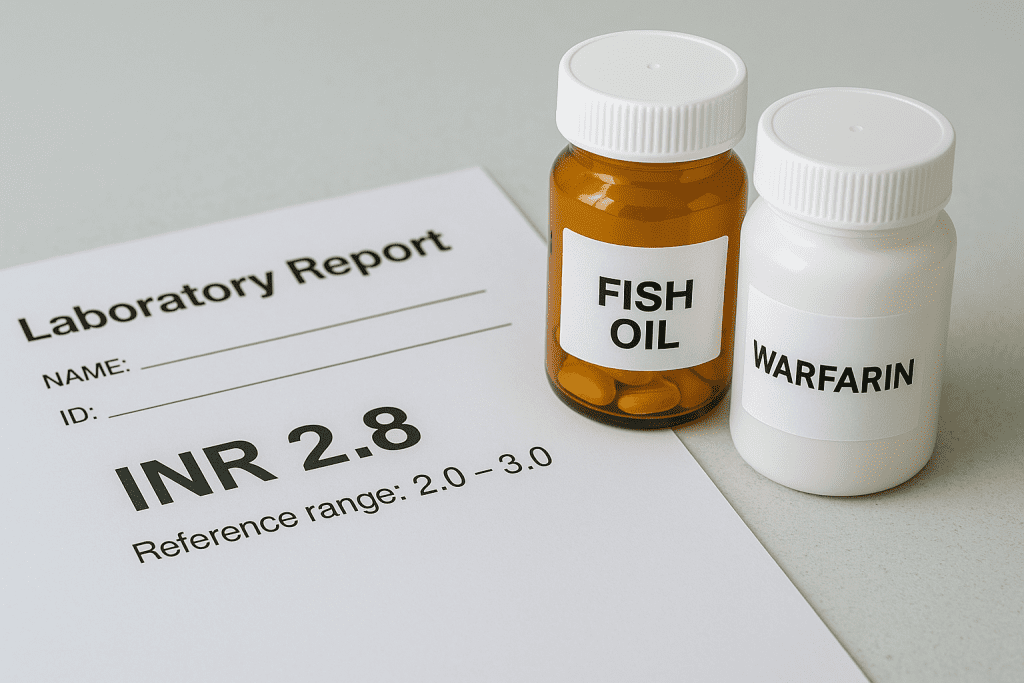
Can Fish Oil Increase Bleeding Risk with Anticoagulants?
If you’re taking a blood thinner like warfarin or apixaban and considering omega-3 supplements, it’s natural to wonder: does fish oil raise your bleeding risk? This guide explores the science behind the fish oil anticoagulant interaction, breaking down theoretical mechanisms, clinical trial data, and professional recommendations—so you can make safe, informed decisions.
We’ll cover how omega-3s impact clotting, summarize the latest research, explain when caution is necessary, and offer actionable tips based on cardiologist guidance.
Quick Summary: Fish Oil + Blood Thinners
| Question | Answer |
|---|---|
| Does fish oil thin the blood? | Yes, omega-3s can reduce platelet aggregation, but usually only mildly. |
| Does it increase bleeding with warfarin or apixaban? | Most studies show no significant increase in bleeding when taken at standard doses. |
| What’s a safe daily dose? | Up to 3 g/day is considered safe; 1–2 g/day is most common. |
| Should I stop fish oil before surgery? | Not necessarily—current evidence does not support routine discontinuation. |
| When should I talk to a doctor? | If you’re on multiple blood thinners or have a bleeding disorder, consult your provider first. |
How Omega-3s Affect Blood Clotting
Omega-3 fatty acids—especially EPA and DHA found in fish oil—have mild blood-thinning properties. They work by changing platelet cell membrane composition, shifting the balance of eicosanoids (chemical messengers) involved in clotting.
This includes:
- Reduced thromboxane A₂ → less platelet activation
- Increased prostaglandin I₂ → more vasodilation and antiplatelet action
These effects can theoretically amplify the action of anticoagulants like warfarin (Coumadin), apixaban (Eliquis), or rivaroxaban (Xarelto). However, theoretical does not always equal clinical significance.
The FDA warns about potential interactions on prescription fish oil labels, but this is largely precautionary based on mechanism—not observed clinical events.
Clinical Trials: Does Fish Oil Increase Bleeding Risk?
1. Large-Scale Surgical Trials
The OPERA trial followed 1,516 patients undergoing heart surgery. Despite high-dose omega-3 supplementation, researchers found:
- No increase in perioperative bleeding
- Fewer blood transfusions in the fish oil group vs. placebo
- Lower bleeding risk in patients with higher omega-3 blood levels
These findings directly contradict the fear of heightened surgical bleeding due to fish oil.
2. Retrospective Studies with Antithrombotic Therapy
A clinical study involving patients taking aspirin + clopidogrel (dual antiplatelet therapy) found no increased bleeding when high-dose fish oil was added. In fact, minor bleeding episodes were lower in the fish oil group than controls.
Another retrospective study of 573 patients on long-term warfarin showed no difference in bleeding rates or INR control with fish oil use.
3. Systematic Reviews
Multiple reviews, including one from PubMed, concluded:
“Fish oil reduced platelet aggregation but did not increase clinical bleeding, even in surgery.”
Even high-quality meta-analyses find no justification for stopping fish oil before invasive procedures.
Cardiologist Recommendations on Omega-3 + Blood Thinners

AHA & ACC Guidance
The American Heart Association (AHA) and American College of Cardiology (ACC) both endorse omega-3s for:
- Heart disease prevention (1 g/day EPA+DHA)
- Triglyceride reduction (up to 4 g/day under prescription)
While they recommend physician supervision for supplement use with anticoagulants, they do not call for routine discontinuation before procedures.
Safe Dosage and Risk Management
| Dosage | Bleeding Risk | Notes |
|---|---|---|
| <3 g/day | Minimal to none | Safe for most people on anticoagulants |
| 3–5 g/day | Still considered safe (per EFSA) | Monitor closely if on multiple blood thinners |
| >5 g/day | Increased risk possible | Only under medical supervision |
One case study described a 75-year-old on warfarin + aspirin + 6 g/day fish oil who developed a subdural hematoma after a minor fall. While rare, this underscores the importance of moderation and supervision—especially in older adults on multiple anticoagulants.
Surgical and High-Risk Patients: Should You Stop Fish Oil?
Surgery and Invasive Procedures
Current evidence does not support stopping fish oil before surgery. In fact, the OPERA trial researchers explicitly suggest:
“There is no reason to delay surgery or stop fish oil supplementation in patients undergoing cardiac procedures.”
High-Risk Combinations
Patients on combinations like:
- Warfarin + aspirin
- Apixaban + fish oil
- Clopidogrel + high-dose omega-3s
…should be monitored closely. For personalized insight, check your INR levels regularly using tools like our Warfarin and vitamin K dosage calculator.
Other interactions worth exploring include CBD oil and warfarin INR fluctuations and saw palmetto and blood thinner interactions.
Final Guidance: Should You Combine Fish Oil with Anticoagulants?

Key Takeaways
- Omega-3s do thin the blood slightly, but clinical trials show no major bleeding risk.
- Safe daily dose: 1–3 g/day (higher only with medical oversight).
- No need to stop fish oil before surgery unless advised by your doctor.
- Monitor INR levels and bleeding symptoms if you’re on warfarin or multiple antithrombotic agents.
- Always consult your doctor, especially if combining supplements with prescription blood thinners.
For more supplement safety guidance, explore our articles on vitamin E and blood thinners hemorrhage risk or natural alternatives.

